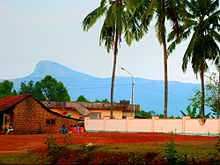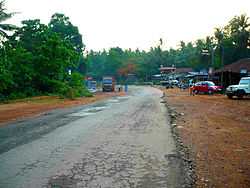Ajekar
Ajekar is a locality in Mangalore city, Karnataka, India. Under this andar also should be considered
| Ajekar ಅಜೆಕಾರು | |
|---|---|
| Village | |
|
Karnataka SH1 towards Karkala at Ajekar | |
 Ajekar Location of Ajekar in Karnataka, India | |
| Coordinates: 13°19′12″N 74°59′59″E / 13.3200755°N 74.99977579°E | |
| Country |
|
| State | Karnataka |
| Region | Tulunadu |
| District | Udupi |
| Taluka | Karkala |
| Government | |
| • Type | Gram panchayat |
| Elevation | 75 m (246 ft) |
| Population (2011) | |
| • Total | 7,172[1] |
| Languages | |
| • Official | Tulu, Konkani, Kannada |
| Time zone | IST (UTC+5:30) |
| PIN | 574101 |
| Telephone code | 08258 |
Ajekar is a small village at the foot of Valikunja in Karkal Taluk of Udupi district, India. It is situated about 40 km from Udupi and about 65 km north-east of Mangalore. Ajekar is also called Marne Grama, which is governed by Grama Panchayat. It is also called Ajekaru in the Kannada language. Kemanj(je)a was one of the oldest names of this village. Ajekar has a mixed population of around 7172 [3,397 male and 3,775 female] (Census 2011), Hindus, Christians, Muslims and Jains.

There is a legend which says: its name is directly derived from the sage Aja. It is said that the sage made his tapasu near this place. The concrete location is un known to this day. There are other modern legends like Ajjana Karu,(most probably which is not correct) Karu is an old Kannada word for land.
The village is located on the road connecting Karkal to Hebri and Agumbe. It has good transportation facilities like bus and Jeeps, three wheeler auto rickshaws. The village is well equipped with other infrastructure like primary and high school (Local and English medium), primary health centre, drinking water facility, electricity, post, and telecommunication facilities.
Ajekar is a peaceful multi-lingual and 'multi-religious centre'. There are Churches, Temple, Mosque, Basadi. Tulu, Kannada, and Konkani are the main languages that are spoken in the village. The people here are pious and religious. People belonging to various faiths and religions, like Hindu, Islam, Christianity, Jainism and some others live together. Communal harmony and religious coherence is the specialty of this village.
Though agriculture is the major occupation of the people of Ajekar, they are in business and other related activities. The major crops grown here are paddy, coconut, areca, cashew, pepper, coca, plantains, rubber etc. In addition the farmers are also involved in dairying, and floriculture activities, thus enhancing their earning. There is no Industry in the village, except a few small cashew and rubber mills.
Ajekar has rich forest resource. The forest covers large areas of the village. The forests have all season trees. Almost all the animals found in the forests of South India could be seen here also. Deer, tiger, leopard, wild pig, sheep, fox, wolf, monkey, variety of snakes are the common animals found in these forests. The varieties of birds are also seen here.
High moisture content in the weather, heavy rainfall during monsoon and hot weather during summer are common features of the climate of the village. Usually from June to September it will be pouring heavily and the average annual rainfall may be around 4,200 mm. The temperature varies from 27 degrees to 34 degrees. From March to May the weather will be very hot and the temperature may rise up to 40 C.
References
External links
http://www.shekarajekar.com/ www.ajekar.blogspot.com
